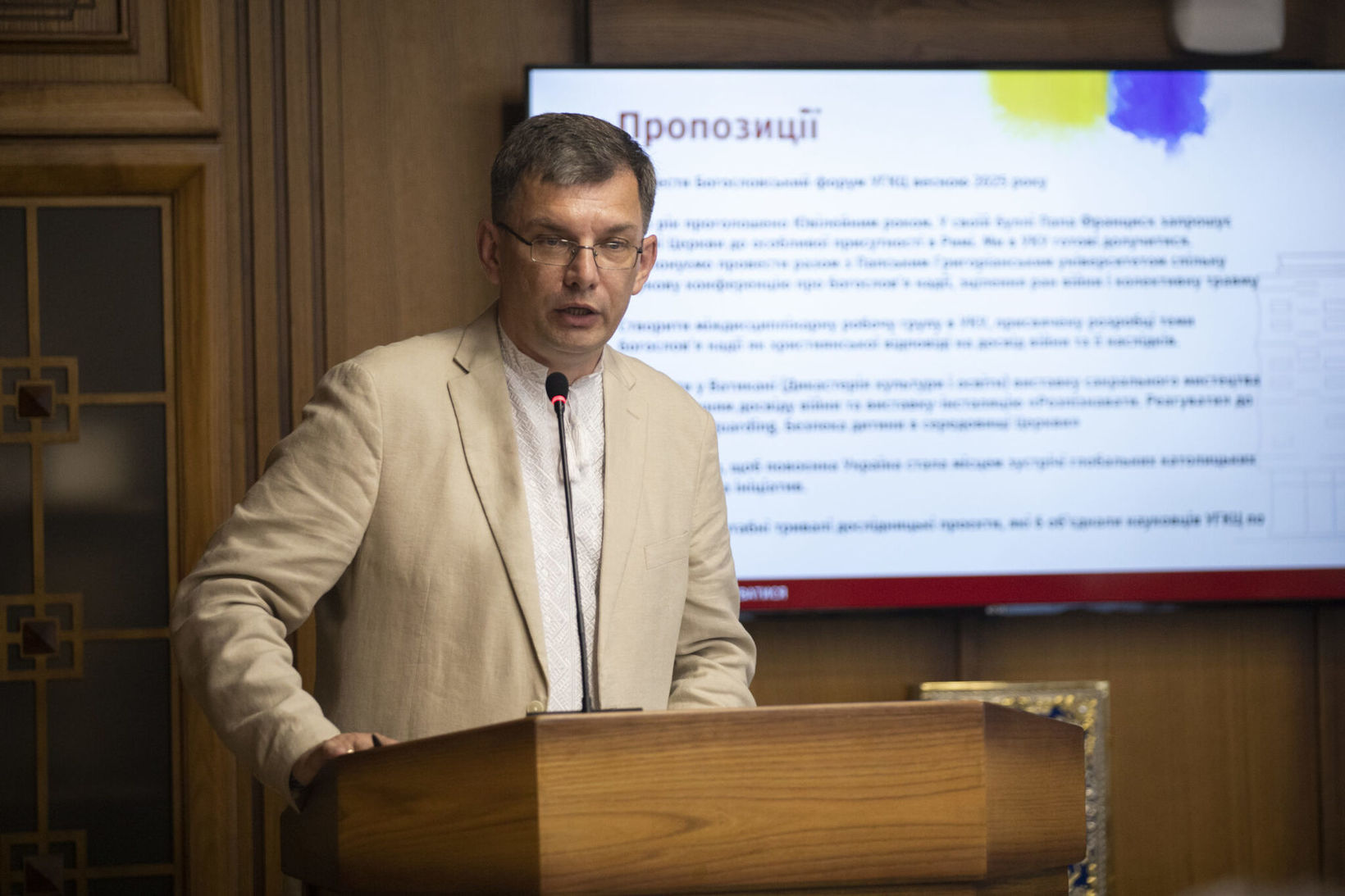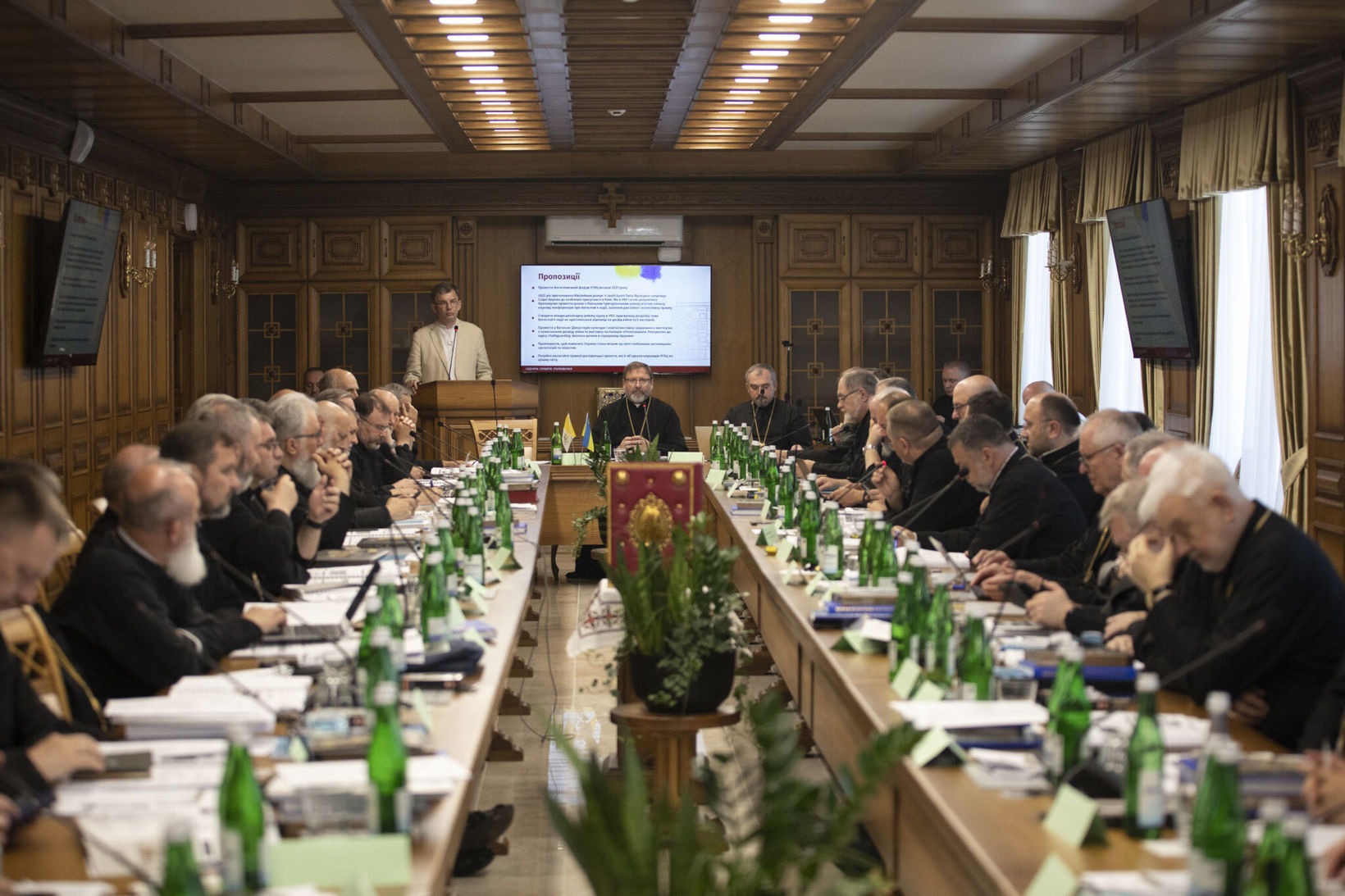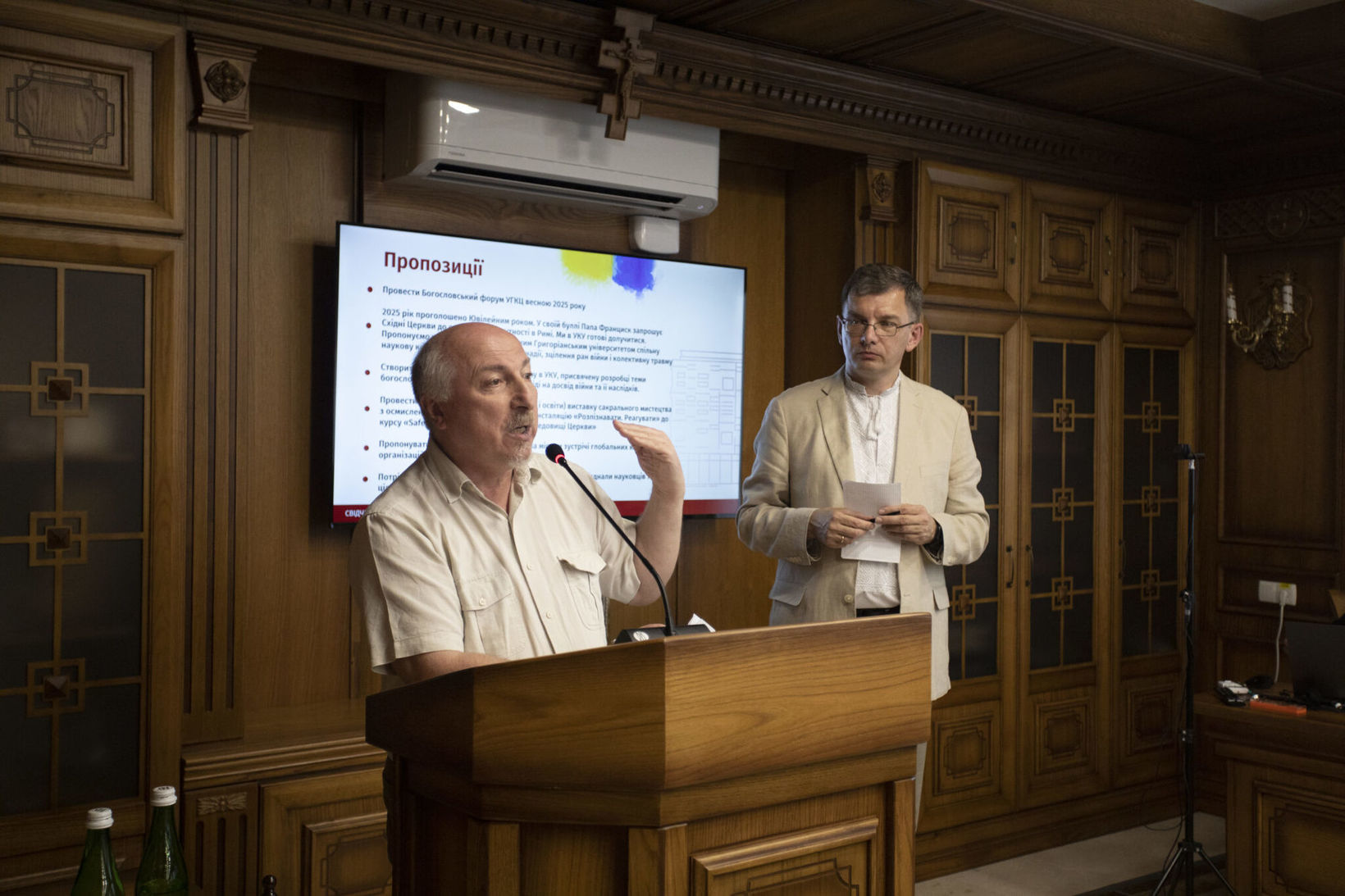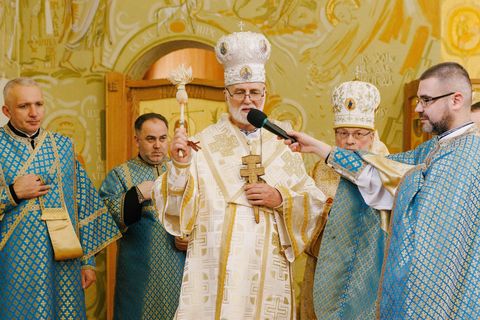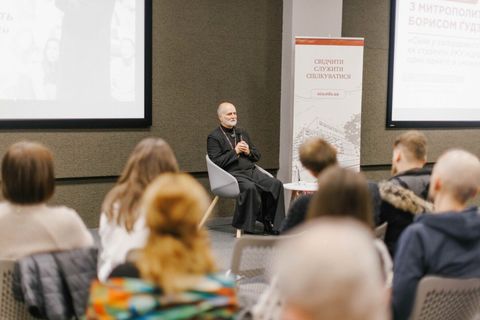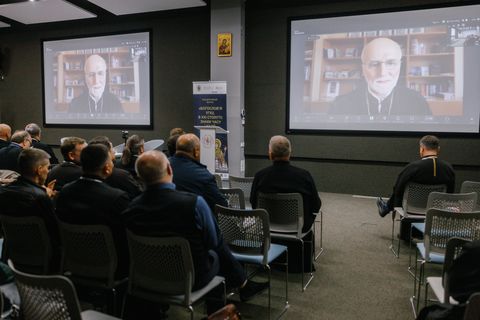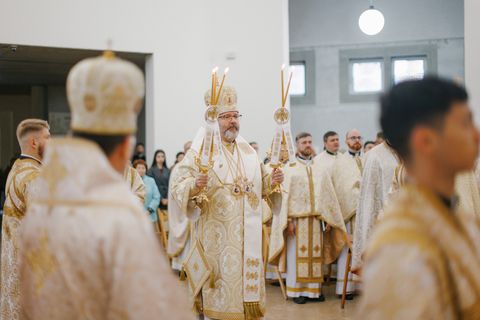“The Global Church Needs a Global University”: UCU Rector Addresses UGCC Synod of Bishops
UCU Rector Taras Dobko presented the development strategy of the Ukrainian Catholic University and reported on his first year as rector at the UGCC Synod of Bishops, which brought together 50 bishops from 35 eparchies and exarchates of the UGCC worldwide.
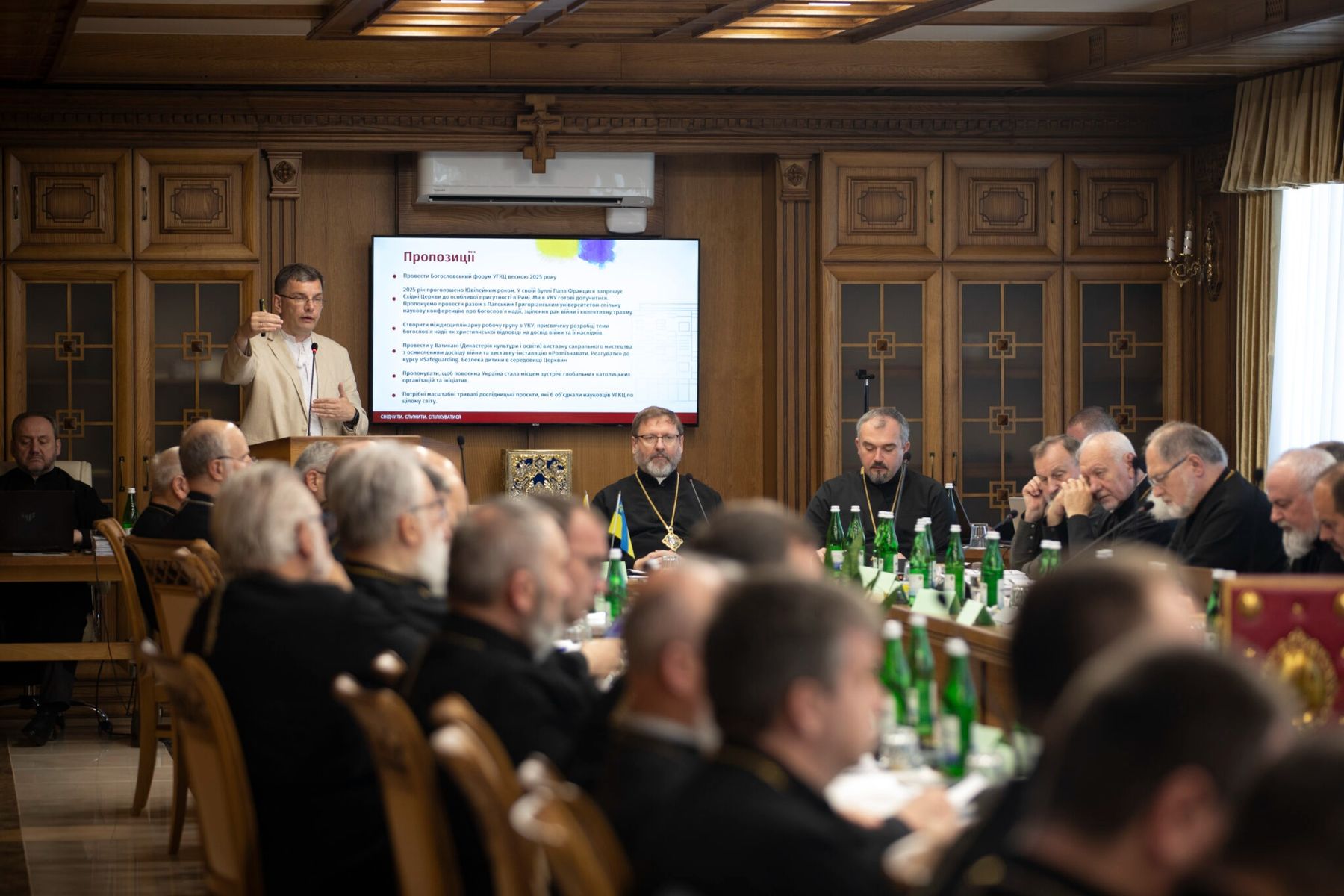
At the outset of his speech, Taras Dobko expressed his gratitude to the students, graduates, and staff of UCU who endanger their lives so we can live, act, and dream: “More than 100 people from the UCU community are defending us with arms at the front. 30 people, including 11 graduates, gave their lives for our dignity and freedom. Eternal memory to them and deepest gratitude!”
Drawing on the UGCC’s pastoral plan, set forth in the pastoral letter “The Hope to Which the Lord Calls Us,” the rector of UCU described how the university is involved in the implementation of each of the following areas: pastoral conversion, establishing networks of communion, the road of healing wounds and treating trauma, closeness and practical care for the poor and marginalized, the Christian family—the domestic church, missionary work, and reaching out to the world.
“We, like every institution in Ukraine, are confronting difficult questions today: how to mitigate the devastating impact of the war on people, how to increase their resilience, where to get strength from, how to help people recover, what to do to heal the wounds of war, how to prepare ourselves and others to recover the country. It is difficult to do so, especially when we see the amount of anxiety around us. Our response to this situation must be hope. We also need inspiration from the leaders of our Church, a kind word of support and encouragement, an atmosphere of care and trust that invigorates and inspires,” the rector addressed the participants of the Synod of the Ukrainian Greek Catholic Church.
The rector offered several proposals for cooperation between UCU and the UGCC in the near future:
· Conduct the UGCC Theological Forum in the spring of 2025.
· Pope Francis has proclaimed 2025 the Jubilee Year. UCU is ready to contribute to preparing the participation of the UGCC in the events of the Jubilee Year. Specifically, we propose holding a joint scientific conference with the Pontifical Gregorian University on the theology of hope, healing the wounds of war, and collective trauma.
· UCU also plans to establish an interdisciplinary working group dedicated to developing a theology of hope as a Christian response to the experience of war and its repercussions.
· UCU is keen to hold an exhibition of sacred art in the Vatican with the support of the Dicastery for Culture and Education, reflecting on the experience of war, and is planning an installation exhibition “Identify. Respond” within the course “Safeguarding. Child Safety in the Church Environment.”
The rector of UCU also emphasized the importance of offering Ukraine as a venue for global Catholic organizations and initiatives in the postwar period. “I am convinced that postwar Ukraine should become a venue for global Catholic organizations and initiatives. Putin seeks to drive Ukrainians from their native land, to make this land deserted. His goal is to eliminate the presence of Ukrainians. To recover the country, we will need a presence, particularly the organization of major Catholic events.”
Taras Dobko also proposed continuing the development of large-scale, ongoing research projects to unite UGCC scholars from around the world. Examples of such projects include “Research of the UGCC Underground,” “Kyivan Christianity,” and “Research of the Personality and Heritage of Metropolitan Andrey Sheptytsky.” The university has also begun work on projects like “Theological and Ethical Reflection on War and Peace in the Spirit of the Social Teaching of the Catholic Church,” “Ad fontes: Translations and Research of the Sources of Christian World and Ukrainian Tradition and Western Civilization,” and others.
“I would also very much like UCU to become a meeting place for those who are ‘scattered’ — a point of gravity for scientifically trained theologians and church historians who have spread out across Ukraine or elsewhere in the world, those who want to contribute to the scientific activity of the Church but for various reasons are not engaged in it. For this purpose, we need extensive research projects because such a network of scholars can be built around them,” the rector summarized.
Answering the bishops’ questions about UCU’s intentions to expand its activities in other countries, particularly in Brazil and Poland, the rector agreed that a global Church needs a global university. Vice-Rector for Strategic Cooperation Oleh Turiy emphasized that this also requires respect for the historical tradition and heritage of our predecessors. In this context, the celebration of the 60th anniversary of the founding of UCU in Rome last year and this year’s celebration of the 30th anniversary of the restoration of the Lviv Theological Academy in Lviv were important.
It is important that plans to revitalize UCU’s activities and expand its geographical presence remain relevant: in Poland, the development of the Wroclaw office; in Germany, joint projects with the Ludwig-Maximilians-University of Munich; and in the United States, strategic cooperation with the University of Notre Dame. We hope to resume communication with the Basilian Institute of Philosophy in Curitiba, Brazil. Cooperation with UCU’s branch in Argentina had to be postponed for a while due to the pandemic and the war: “But now this branch is headed by a UCU graduate and there is hope for the resumption of cooperation. It is through such partnerships and the structures of the UGCC in other countries that we hope to reach new formats of our presence in Latin America, which is becoming very important given the current geopolitical circumstances,” Oleg Turiy emphasized.
Based on materials from the UCU press center
Photo by the UGCC Department for Information
